Duke Manufacturing FWM34-43 (Renau) Operating instructions
- Category
- Food warmers
- Type
- Operating instructions
This manual is also suitable for

Installation and
Operation Manual
PRODUCT HOLDING
CABINET
Please read this manual completely before attempting
to install, operate or service this equipment
This manual is Copyright © 2008 Duke Manufacturing Co. All rights reserved.
Reproduction without written permission is prohibited. Duke is a registered
trademark of the Duke Manufacturing Co.
Duke Manufacturing Co.
2305 N. Broadway
St. Louis, MO 63102
Phone: 314-231-1130
Toll Free: 1-800-735-3853
Fax: 314-231-5074
www.dukemfg.com
P/N 156224E
MODELS
FWM34-22
FWM34-23
FWM34-42
FWM34-43

Installation and Operation of Product Holding Cabinets
2
TABLE OF CONTENTS
ELECTRICAL WARNINGS ................................................................................................3
MANUFACTURER’S INTRODUCTION .............................................................................5
SPECIFICATIONS .............................................................................................................6
Model FWM34-22 .......................................................................................................6
Model FWM34-23 .......................................................................................................7
Model FWM34-42 .......................................................................................................8
Model FWM34-43 .......................................................................................................9
INSTALLATION INSTRUCTIONS ...................................................................................10
Unpacking Unit .........................................................................................................10
Unit Placement .........................................................................................................10
Clearance Requirements ..........................................................................................10
Earthing Instructions .................................................................................................10
External Equipotential Earthing Terminal (Export Only) ...........................................10
OPERATION .................................................................................................................... 11
Opening Checklist .................................................................................................... 11
Operation Instructions and Adjustments ................................................................... 11
Closing Checklist ...................................................................................................... 11
Cleaning Instructions ................................................................................................ 11
STAINLESS STEEL CARE .............................................................................................. 11
Cleaning ................................................................................................................... 11
Preserving & Restoring ............................................................................................12
Heat Tint ...................................................................................................................12
KEYPAD PROGRAMMING .............................................................................................12
Power Up ..................................................................................................................12
Timer Operation ........................................................................................................13
Time Decrement .......................................................................................................13
Menu Mode ..............................................................................................................14
Enter Menu Mode ..............................................................................................14
Change Meal Set ...............................................................................................14
Display Link, Hold Time & Temperature ............................................................14
Exit Menu Mode ................................................................................................14
TROUBLESHOOTING ....................................................................................................15
Electronic Control Fault Indications ..........................................................................15
Temperature Check Procedure ................................................................................15
Service Hot-Line .......................................................................................................15
TABLE 1: PARTS LIST – FWM34-22 & FWM34-23 .......................................................16
TABLE 2: PARTS LIST – FWM34-42 & FWM34-43 .......................................................18
WIRING SCHEMATICS ...................................................................................................20
CUSTOMER ASSISTANCE .............................................................................................22

3
Installation and Operation of Product Holding Cabinets
ELECTRICAL WARNINGS
THIS MANUAL HAS BEEN PREPARED FOR PERSONNEL QUALIFIED TO INSTALL
ELECTRICAL EQUIPMENT, WHO SHOULD PERFORM THE INITIAL FIELD STARTUP
AND ADJUSTMENTS OF THE EQUIPMENT COVERED BY THIS MANUAL.
READ THIS MANUAL THOROUGHLY BEFORE OPERATING, INSTALLING OR PERFORMING
MAINTENANCE ON THE EQUIPMENT.
: Failure to follow all the instructions in this manual can cause
property damage, injury or death.
: Improper installation, adjustment, alteration, service or maintenance
can cause property damage, injury or death.
: Electrical connections should be performed only by a certied
professional.
: Electrical and grounding connections must comply with the applicable
portions of the National Electric Code and/or all local electric codes. Failure to
comply with this procedure can cause property damage, injury or death.
: Before connecting the unit to the electrical supply, verify that the
electrical and grounding connections comply with the applicable portions of the
National Electric Code and/or other local electrical codes. Failure to comply with
this procedure can cause property damage, injury or death.
: Before connecting the unit to the electrical supply, verify that the
electrical connection agrees with the specications on the data plate. Failure to
comply with this procedure can cause property damage, injury or death.
: UL73 grounding instructions: This appliance must be connected to
a grounded, metal, permanent wiring system. Or an equipment-grounding conductor
must be run with the circuit conductors and connected to the equipment-grounding
terminal or lead on the appliance. Failure to comply with this procedure can cause
property damage, injury or death.
: Appliances equipped with a exible electric supply cord, are provided
with a three-prong grounding plug. It is imperative that this plug be connected into
a properly grounded three-prong receptacle. Failure to comply with this procedure
can cause property damage, injury or death.
: If the receptacle is not the proper grounding type, contact an
electrician. Do not remove the grounding prong from the plug. Failure to comply
with this procedure can cause property damage, injury or death.

Installation and Operation of Product Holding Cabinets
4
: Before performing any service that involves electrical connection
or disconnection and/or exposure to electrical components, always perform the
Electrical LOCKOUT/TAGOUT Procedure. Disconnect all circuits. Failure to comply
with this procedure can cause property damage, injury or death.
: Before removing any sheet metal panels or servicing this equipment,
always perform the Electrical LOCKOUT/TAGOUT Procedure. Be sure all circuits are
disconnected. Failure to comply with this procedure can cause property damage,
injury or death.
: Do not operate this equipment without properly placing and securing
all covers and access panels. Failure to comply with this procedure can cause
property damage, injury or death.
: Do not use or store gasoline or other ammable vapors or liquids
in the vicinity of this or any other appliance. Failure to comply can cause property
damage, injury or death.
: In the event of a power failure, do not attempt to operate this
appliance. Failure to comply can cause property damage, injury or death.
FOR YOUR SAFETY
DO NOT STORE OR USE GASOLINE OR OTHER FLAMMABLE VAPORS OR LIQUIDS
IN THE VICINITY OF THIS OR ANY OTHER APPLIANCE. FAILURE TO COMPLY CAN
CAUSE PROPERTY DAMAGE, INJURY OR DEATH.
CAUTION
Observe the following:
• Minimumclearancesmustbemaintainedfromallwallsandcombustiblematerials.
• Keeptheequipmentareafreeandclearofcombustiblematerial.
• Maintainadequateclearanceforairopenings.
• Operateequipmentonlyonthetypeofelectricityindicatedonthedatasticker.
• Retainthismanualforfuturereference.

5
Installation and Operation of Product Holding Cabinets
MANUFACTURER’S INTRODUCTION
The Duke Product Holding Unit was developed
for extended food-holding capabilities to provide
consistently high, “just cooked” food quality.
The Duke Product Holding Unit utilizes Duke’s patented
“heat sink” holding technology that provides even heat
distribution to food pans through the bottom and sides.
This allows pre-cooked foods to be held for extended
periods without noticeable degradation of quality,
reducing food scrap/waste.
The self contained, individually formed, sealed
compartments of the Duke Product Holding Unit
eliminates food odor and taste transfer. Because the
compartments are sealed and formed to the shape of
the pan, no disassembly is required for cleaning and
product changes.
The unique design of the Duke Product Holding Unit
allows single temperature operation for all existing
product groups. This 190°F approved temperature
is preset at the factory. This reduces the likelihood
of inconsistent performance between restaurant
locations.
The Duke Product Holding Cabinet was also designed
to rethermalize food product. A thermostat setting of
200°F minimum is required for re-thermalization.
: Only qualied service persons should
modify control temperature presets.
Supplier Name: Duke Manufacturing Co.
Address: 2305 N. Broadway
St. Louis, MO 63102
Model #:
FWM34-22-120 FWM34-43-208
FWM34-22-208 FWM34-43-230
FWM34-22-230
FWM34-42-120
FWM34-24-120 FWM34-42-208
FWM34-24-208 FWM34-42-230
FWM34-24-230
Serial #:
Date Received:
Date Installed:
Telephone: (800) 735-DUKE (3853)
(314) 231-1130
Fax: (314) 231-5074
Service Referral #:
Local Service Name
Local Service #
Installation requirements
PowerConnection:SeeSpecications

Installation and Operation of Product Holding Cabinets
6
SPECIFICATIONS
MODEL FWM34-22
MODEL NO SHIPPING WEIGHT VOLTS AC AMPS WATTS HZ
FWM34-22-120 61 lbs / 27.7 Kg 120 6.7 800 50/60
FWM34-22-208 61 lbs / 27.7 Kg 208 5.8 1200 50/60
FWM34-22-230 61 lbs / 27.7 Kg 230 5.2 1200 50/60

7
Installation and Operation of Product Holding Cabinets
MODEL FWM34-23
MODEL NO SHIPPING WEIGHT VOLTS AC AMPS WATTS HZ
FWM34-23-120 83.5 lbs / 37.39 Kg 120 10.0 1200 50/60
FWM34-23-208 83.5 lbs / 37.39 Kg 208 8.7 1800 50/60
FWM34-23-230 83.5 lbs / 37.39 Kg 230 7.8 1800 50/60

Installation and Operation of Product Holding Cabinets
8
MODEL FWM34-42
MODEL NO SHIPPING WEIGHT VOLTS AC AMPS WATTS HZ
FWM34-43-208 180 lbs / 81.6 Kg 208 17.3 3600 50/60
FWM34-43-230 180 lbs / 81.6 Kg 230 15.7 3600 50/60
L6-30P
Twist Lock Plug
IEC 60309
3 Pin & Sleeve Plug

9
Installation and Operation of Product Holding Cabinets
MODEL FWM34-43
MODEL NO SHIPPING WEIGHT VOLTS AC AMPS WATTS HZ
FWM34-43-208 180 lbs / 81.6 Kg 208 17.3 3600 50/60
FWM34-43-230 180 lbs / 81.6 Kg 230 15.7 3600 50/60
L6-30P
Twist Lock Plug
IEC 60309
3 Pin & Sleeve Plug

Installation and Operation of Product Holding Cabinets
10
INSTALLATION INSTRUCTIONS
UNPACKING UNIT
1. Inspect the shipping carton and/or container,
carefully noting any exterior damage on the delivery
receipt.
2. Contactthecarrierimmediatelyandleadamage
claim with them. Save all packing materials when
ling a claim. Freight damage claims are the
responsibility of the purchaser and are not covered
by the warranty.
3. Unpack and Inspect the unit for damage.
4. Report any dents or breakage to the source of
purchase immediately.
CAUTION: Do not attempt to use unit if damaged.
5. Remove all materials from the unit interior.
6. If the unit has been stored in extremely cold area,
wait a few hours before connecting the power.
UNIT PLACEMENT
• Donotinstalltheunitnexttooraboveheatsources,
such as oven or deep fat fryer.
• Installtheunitonalevelcountertopsurface.
• Thepoweroutletshouldbelocatedsothatplugis
accessible when the unit is in place.
Clearance Requirements
UNIT SIDE CLEARANCE IN INCHES
Right Side 0
Left Side 0
Rear 8
Floor 0
• Properairowaroundtheunitcoolsitselectrical
components.Withrestrictedairow,theunitmay
not operate properly and life of the electrical parts
is reduced.
: To avoid risk of electrical
shock or death, this unit must be grounded
and plug must not be altered.
EARTHING INSTRUCTIONS
THE UNIT MUST BE GROUNDED. Grounding reduces
risk of electric shock by providing an escape wire for
the electric current if an electrical short occurs. This
unit is equipped with a cord having a grounding wire
with a grounding plug. The plug must be plugged into
a receptacle that is properly installed and grounded.
Grounded Outlet
Consult a qualied electrician or service agent if
grounding instructions are not completely understood,
or if doubt exists as to whether the oven is properly
grounded.
DO NOT USE AN EXTENSION CORD. If the product
power cordistoo short, have a qualied electrician
install a three-slot receptacle. This unit should be
plugged into a separate circuit with the electrical rating
as provided on the product data plate.
EXTERNAL EQUIPOTENTIAL EARTHING
TERMINAL (EXPORT ONLY)
This equipment has secondary earthing terminal. The
terminal provides an external earthing connection
used in addition to the earthing prong on the plug. The
external earthing terminal is located on outside of oven
back, the terminal is marked with this symbol.

11
Installation and Operation of Product Holding Cabinets
OPERATION
The following procedures must be performed on a
daily basis.
OPENING CHECKLIST
1. Ensure proper Pan Covers are inserted into the
correct locations for fried and broiled products.
2. Place the Power Switch, located on the front of the
Product Holding Unit, in the ON position.
3. Allow the Product Holding Cabinet to heat for at
least 20 min. or until the temperature disappears
and the menu bars display the pre-programmed
product names: “EGGS”, “FISH”, “----“ or “EMTY”
(no product).
OPERATION INSTRUCTIONS AND
ADJUSTMENTS
1. If the menu bars display temperature at any time
during operation of the Product Holding Cabinet,
discontinue use of the affected shelf until the cabinet
is serviced.
2. Refer to the Keypad Programming section of the
manual for instructions on using and programming
the keypad.
CLOSING CHECKLIST
1. Place the Power Switch in its OFF position.
2. Remove all pans and pan covers.
3. Allow the cabinet to cool for approximately
30 minutes.
4. Refer to the Cleaning Instructions section of
the manual for proper care and cleaning of the
cabinet.
: Electrical Shock Hazard, unplug
the cabinet before cleaning it.
: Do not wash with water jet
or hose.
: Bottom and sides of warmer
wells are very hot and cool slowly.
CAUTION: Do not use caustic cleaners, acids,
ammonia products or abrasive cleaners or abrasive
cloths. These can damage the stainless steel
and plastic surfaces.
CLEANING INSTRUCTIONS
1. Wipe down the interior and exterior of the Product
Holding Cabinet with warm water and mild detergent
using a soft cloth. Do not use excessive amounts
of water.
2. Clean pans and pan covers using mild detergent
and warm water.
3. Ensure all soap is rinsed from plastic pans and
pan covers.
STAINLESS STEEL CARE
Cleaning
Stainless steel contains 70-80% iron, which will rust
if not properly maintained. It also contains 12-30%
chromium, which forms an invisible passive, protective
lmthatshieldsagainstcorrosion.Ifthelmremains
intact, the stainless steel will remain intact. However,
ifthelmisdamaged,thestainlesssteelcanbreak
down and rust. To prevent stainless steel breakdown,
follow these steps:
CAUTION: Never use any metal tools. Scrapers,
les, wire brushes or scouring pads (except
for stainless steel scouring pads) will mar the
surface.
CAUTION: Never use steel wool, which will leave
behind particles that rust.
CAUTION: Never use acid-based or chloride-
containing cleaning solutions, which will break
down the protective lm.
CAUTION: Never rub in a circular motion.

Installation and Operation of Product Holding Cabinets
12
CAUTION: Never leave any food products or
salt on the surface. Many foods are acidic. Salt
contains chloride.
For routine cleaning, use warm water, mild soap or
detergent and a sponge or soft cloth.
For heavy-duty cleaning, use warm water, a degreaser
and a plastic, stainless steel or Scotch-Brite pad.
Always rinse thoroughly. Always rub gently in the
direction of the steel grain.
Preserving & Restoring
Special stainless steel polishing cleaners can preserve
andrestoretheprotectivelm.
Preserve the life of stainless steel with a regular
application of a high quality stainless steel polishing
cleanerasanalsteptodailycleaning.
If signs of breakdown appear, restore the stainless
steel surface. First, thoroughly clean, rinse and dry the
surface. Then, on a daily basis, apply a high-quality
stainless steel polish according to manufacturer’s
instructions.
Heat Tint
Darkened areas, called heat tint, may appear on
stainless steel exposed to excessive heat, which causes
theprotectivelmtothicken.Itisunsightlybutisnota
sign of permanent damage.
To remove heat tint, follow the routine cleaning
procedure. Stubborn heat tint will require heavy-duty
cleaning.
To reduce heat tint, limit the exposure of equipment
to excessive heat.
KEYPAD PROGRAMMING
Pan Status Keyboard – Item Locator
1. Status LEDs: Used for indicating status of pan.
a. Non-Illuminated
I. Timer is Inactive - no product in pan,
OR
II. Timer is Active - product in pan – use pan
withGREENSTATUSLEDrst.
b. Green = Timer is Active – product in pan
(userst)
c. Flashing Green = Cook Warning Time reached
(cook more product) or keyboard in EDIT
MODE (programming).
2. Arrow Buttons
a.
Used for Starting/Stopping/Resetting Timer.
b. Used for Programming.
c. Indicate which pan the adjacent Status
LED and Pan Display are linked to (i.e.
Status LED and Pan Display on left side
of keyboard are linked to the pan above
the keyboard and the Status LED and Pan
Display on right side of keyboard are linked
to the pan below).
3. Pan Display
a. Displays Product Name and Hold Time
Remaining (alternates between the two
when Timer is active).
4. Enter Button
a.
Used for Time Decrement and Programming.
Power Up
1. Place the Power Switch in the ON position. Software
initializes at startup.

13
Installation and Operation of Product Holding Cabinets
2. Until warmer reaches preprogrammed operating
temperature, all displays will show actual temperature.
3. When the set point is reached, Product Name
appears on all Pan Displays.
Note: For these instructions only the pertinent keypads
will be shown, for simplicity, and not the warmer or
pans. It is implied that a product pan is located above
and below each keypad.
Timer Operation
1. Press Arrow Button that corresponds to pan the
product is in. (In this example, there is product in
pan above keypad).
2. Status LED turns GREEN (unless same product
present in another pan, then Status LED will remain
non-illuminated) and Pan Display alternately shows
Time Remaining and Product Name.
3. At t=cook time (set to 4 minutes) the Status
LED begins FLASHING, alarm sounds and
Display alternately flashes Time Remaining
and Product Name.
4. Push Arrow Button to silence alarm – Status LED
remainsGREENandstopsashing.
5. At t=0, alarm sounds, Status LED is FLASHING
and “00:00” is FLASHING in the Display. Discard
product in pan. Press corresponding Arrow Button
to silence alarm and reset timer.
6. Status LED becomes non-illuminated and Display
shows Product Name only. The pan is ready for
more product.
Note: To reset the time when product is depleted, press
and release the corresponding arrow key. The status
LED will become non-illuminated any status LED on
thesameproductwillturngreen,indicatinguserst.
Time Decrement
This program is used to alter Hold Time when introducing
a product from another warming unit.
Example: Transfer CORN from another warmer with
19 minutes left on Hold Time.
1. Press and hold the Arrow Button corresponding
to the pan that’s being edited for three seconds.
The display will appear as shown below with a
FLASHING Status LED and a down arrow in the
Display indicating the timer is in decrement mode.
2. Repeatedly pressing the Arrow Button decrements
time by one minute per depression.
3. Holding down the button continuously will slow the
time down.

Installation and Operation of Product Holding Cabinets
14
4. To increment time, press the Enter Button. The
arrow on display will point up to denote incrementing
time as shown below.
5. Repeatedly pressing the Arrow Button increments
time by one minute per depression.
6. Holding down the button continuously will slew the
time up.
7. When the proper time is reached on the Display
release the Arrow Button and after 5 seconds
unit will accept new time and return to normal
operation.
Menu Mode
This option is used to change Meal Set and view,
Linking, Hold Time and Hold Temp.
Enter Menu Mode
1. Press and hold the Enter Button for three seconds.
Status LED FLASHES GREEN and “MENU” is
displayed on left Display and “UP” is displayed
on right, indicating upper well information will be
displayed.
2. To view lower well information press the Down Arrow
Button – “DOWN” will appear in the right Display.
FLASHING Status LED will be present on side of
keypad corresponding to well being viewed.
3. Press the Enter Button to accept.
Change Meal Set
Note: The Meal Set can be changed globally from
any keyboard.
1. Status LED stops ashing and “MEAL” “SET1”
appears on the Display.
2. Press the Enter Button again. Status LED
FLASHES indicating edit mode.
3. Use the Arrow Buttons to scroll to desired Meal Set
and press the Enter Button to accept. Status LED
stopsashinganddesiredMealSetisdisplayed.
Display Link, Hold Time & Temperature
Press Arrow Button repeatedly to scroll through Link,
Time and Temperature settings.
Exit Menu Mode
Scroll to EXIT and press the Enter Button to exit
menu mode.

15
Installation and Operation of Product Holding Cabinets
TROUBLESHOOTING
There are no user serviceable parts on the Duke
Product Holding Cabinet. If a malfunction occurs,
ensure unit is plugged in then check all switches and
circuit breakers. If the malfunction still exists, contact
your Duke Manufacturing Company authorized service
agent or call 1-800-735-3853.
ELECTRONIC CONTROL
FAULT INDICATIONS
Location of RTD
The keypad display provides an indication to alert the
operator to failures in the heater circuit. The possible
fault conditions are as follows:
1. Over-Temperature Fault - An over-temperature
fault occurs when the control senses that the shelf
temperature is higher than the specied factory
preset temperature for thirty minutes. This occurs
when the power is not removed from the heating
element after the shelf has achieved the preset
temperature. The auxiliary thermostat prevents the
temperature from exceeding safe levels by regulating
the temperature to a maximum of 250°F. If this
occurs, “HI” will appear on the keypad; the affected
unit should not be used until the cause of the fault
iscorrectedbyaqualiedservicetechnician.
2. Under-Temperature Fault - An under-temperature
fault occurs when the control senses that the shelf
temperature is lower than the specied factory
preset temperature for more than thirty minutes
continuously. This occurs when heating element
circuit opens or the RTD Feedback signal is faulty. If
this occurs, “LO” will appear on the keypad and the
affected unit should not be used until the cause of the
faultiscorrectedbyaqualiedservicetechnician.
3. Sensor Fault – If it any time during normal
operation “SENS” is displayed on the keypad:
discontinue operation and contact qualied
service technician.
TEMPERATURE CHECK PROCEDURE
1. A digital temperature meter that has been calibrated
must be used to get an accurate temperature
reading. Use a thermocouple surface temperature
probe to measure temperatures.
2. No pans should be in wells during the pre-heat
and temperature check. Pre-heat the warmer for
30 minutes before taking any temperature readings.
Do not take readings unless the cavity has been
empty for 30 minutes. This will allow the temperature
to stabilize and will prevent false readings.
3. The warmer cavity should be cleaned and empty
before the temperature is checked. Avoid any air
draftsthatmightowthroughthecavity.
4. Locate the surface temperature probe on the bottom
oftherstcavityinthegeometriccenter.Therst
cavity is the one closest to the control panel (see
Figure 21). Make sure the probe is making good
contact with the surface while taking readings.
5. All temperature controls exhibit a swing in
temperature as the control cycles on and off while
regulating to the set point. The correct calibration
temperature is the average of several readings
taken over a period of 20 minutes after the warmer
has been pre-heated. The average temperature
should be ± 5°F from the set point.
SERVICE HOT-LINE
Check the display for fault messages. Perform the
Temperature Check Procedure in this manual. Make note of
thendings.Please,havethisdatahandybeforecallingthe
Duke troubleshooting Hot Line listed above. For optimum
support, please be near the suspect units with a cordless
phone, if available, when calling our Technicians.

Installation and Operation of Product Holding Cabinets
16
TABLE 1: PARTS LIST - FWM34-22, FWM34-23
LOCATOR P/N DESCRIPTION FWM34-22 FWM34-23
QUANTITY QUANTITY
1* 156603 Cord,Power 15 AMP 125V w.term 1 1
156624 Cord,Power 15 AMP 250V w.term 1 1
156631 Cord,Power 16 AMP 230V w.term CE 1 1
2 156316 Transformer, 120Vprimary,12Vsecondary 1 1
155749 Transformer, 208V/240Vprimary,12Vsecondary 1 1
156838 Transformer, 230Vprimary,12Vsecondary 1 1
3 157829 Control, Main FWM 1 1
4 157830 Relay Smart Power Module 2 2
5 156938 Terminal Block, 5 Position 1 1
6 157490 Faceplate with Gasket Assy 2X2 2
157410 Faceplate with Gasket Assy 2X3 - 2
7 157428 Heating Element, 120V, 2 Wide, Deep well 4 -
157418 Heating Element, 120V, 3 Wide, Deep well - 6
157748 Heating Element, 208V, 2 Wide, Deep well 4 -
157736 Heating Element, 208V, 3 Wide, Deep well - 6
157749 Heating Element, 230V, 2 Wide, Deep well 4 -
157737 Heating Element, 230V, 3 Wide, Deep well - 6
8 155750 RTD, 1000 Ohms, Temperature Sensor,24” 2 2
9 156195 USB Host Adapter 1 1
10 156527 Switch,Lighted,DPST,On-Off, 16 AMP,250VAC 1 -
11 155753 Thermostat, Hi-Limit 4 4
12 156184 Timer Bar 2-Wide 1 or 2 -
156227 Timer Bar 3-Wide - 1 or 2
13 157828 Keypad, Display 2 or 4 3 or 6
14 156736 Label – Control 1 1
15 157717 Extrusion – Heat Sink 4”D black 4 6
16 156310 Panel, Access top, 2 Wide 1 -
156298 Panel, Access top, 3 Wide - 1
17 157405 Panel, Access Left/Right 2 2
18* 157744 Food Pan with Notch (no handle) AR AR
157756 Food Pan with Handle
19* 155876 Lid (Black) without vent holes AR AR
155873 Lid (Gray) with vent holes
20 156285 Latch, Lid Stop 8 16
21 156288 Screw, Shoulder 8 16

17
Installation and Operation of Product Holding Cabinets
16
17
6
21
20
12
13
4
2
3
5
9
10
14
15
7
11
8
Detail A
Detail B
A
FWM34-22 & FWM34-23

Installation and Operation of Product Holding Cabinets
18
TABLE 2: PARTS LIST FWM34-42 & FWM34-43
LOCATOR P/N DESCRIPTION FWM34-42 FWM34-43
QUANTITY QUANTITY
1* 159211 Cord, Power, 15 AMP, 125V,for 120V units 1 -
159243 Cord, Power, 20 AMP, 250V,for 208-240V units 1 -
159142 Cord, Power, 30 AMP, 250V,for 208-240V units - 1
2 156316 Transformer, 120Vprimary,12Vsecondary 1 -
155749 Transformer, 208V/240Vprimary,12Vsecondary 1 1
156838 Transformer, 230Vprimary,12Vsecondary
3 157829 Control, Main FWM 1 1
4 157830 Relay Smart Power Module 2 2
5 157743 Terminal Block, 8 Position 1 1
6 157739 Faceplate with Gasket Assy 4X2 2
157738 Faceplate with Gasket Assy 4X3 - 2
7 157736 Heating Element, 208V, 3 Wide, Deep well - 12
157737 Heating Element, 230V, 3 Wide, Deep well
157428 Heating Element, 120V, 2 Wide, Deep well 8 -
157748 Heating Element, 208V, 2 Wide, Deep well
157749 Heating Element, 230V, 2 Wide, Deep well
8 157725 RTD, 1000 Ohms, Temperature Sensor,54” 4 4
9 156195 USB Host Adapter 1 1
10 156527 Switch,Lighted,DPST,On-Off, 16 AMP,250VAC 1 -
159084 Switch,Lighted,DPST,On-Off, 20 AMP,250VAC - 1
11 155753 Thermostat, Hi-Limit 4 4
12 156184 Timer Bar 2-Wide 2 or 4 -
156227 Timer Bar 3-Wide - 2 or 4
13 157828 Keypad, Display 4 or 8 6 or 12
14 156186 Label – Control 1 1
15 157717 Extrusion – Heat Sink 4”D black 8 12
16 157716 Panel, Access top, 2 Wide 1 -
157715 Panel, Access top, 3 Wide - 1
17 157722 Panel, Access Left/Right X 2
18* 157744 Food Pan with Notch (no handle) AR AR
157756 Food Pan with Handle
19* 155876 Lid (Black) without vent holes AR AR
155873 Lid (Gray) with vent holes
20 156285 Latch, Lid Stop 8 16
21 156288 Screw, Shoulder 8 16
*Note: Not shown

19
Installation and Operation of Product Holding Cabinets
FWM34-42 & FWM34-43

Installation and Operation of Product Holding Cabinets
20
WIRING SCHEMATICS
P2-14
P2-15
VAC IN
GND
12 VAC
GRN/YEL
1 BLK
2 WHT
HMC-34
CONTROLLER
12VAC
+5VDC
GND
DATA
GND
+5V
DATA FRONT
HEATER #1
HEATER #2
P2-1
P2-2
P2-3
RED
BLK
YEL
1
2
3
4
P2-5
P2-4
P2-6
SPS-204 KEYPAD
RTD 1
RTD 2
P1-14
P1-7
P1-8
P1-1
F1 F2
8888 88888888 8888
BLK
RED
WHT
YEL
4
3
2
1
1
3
2
4
POWER
MODULE
#1 - #2
5 BLK
3 WHT
6 BLK
4 WHT
5 BLK
3 WHT
12 WHT
14 WHT
5 BLK
3 WHT
8 BLU
9 BLU
AUX TSTAT
AUX TSTAT
10 BLU
10 BLU
5 BLK
5 BLK
19 WHT
19 WHT 19 WHT
11 2 3 4
USB
HOST
UHA-7
P2-18
P2-8
P2-19
P2-9
ORN
YEL
WHT
GRN
+5VDC
GND
Tx
Rx
P2-10
BLK
P2-20
RED
RTS
CTS
6
5
4
3
2
1
GND
+5V
DATA REAR
P2-12
P2-11
P2-13
R1
R2
8888 8888
8888 8888
BLK
RED
WHT
YEL
1 2 3 4 1
HEATER #1
RTD #1
HEATER #2
RTD #2
F1
F2
R2
R1
FRONT
REAR
8888 88888888 8888
YEL
1
1
R3
R4
8888 8888
8888 8888
YEL
1
1
F3 F4
YEL
YEL
CONTROL PANEL
NOTE: F1 IS ALWAYS LEFTMOST KEYPAD WHEN
VIEWING FROM FRONT OF UNIT, R1 IS ALWAYS
RIGHT MOST WHEN VIEWING FROM REAR.
(F3/R3) FWM3-23 ONLY; (F3/R3, F4/R4) FWM3-24 ONLY
UNITS WITH REAR DISPLAYS ONLY
FWM34 2-High Schematic
Page is loading ...
Page is loading ...
Page is loading ...
-
 1
1
-
 2
2
-
 3
3
-
 4
4
-
 5
5
-
 6
6
-
 7
7
-
 8
8
-
 9
9
-
 10
10
-
 11
11
-
 12
12
-
 13
13
-
 14
14
-
 15
15
-
 16
16
-
 17
17
-
 18
18
-
 19
19
-
 20
20
-
 21
21
-
 22
22
-
 23
23
Duke Manufacturing FWM34-43 (Renau) Operating instructions
- Category
- Food warmers
- Type
- Operating instructions
- This manual is also suitable for
Ask a question and I''ll find the answer in the document
Finding information in a document is now easier with AI
Related papers
-
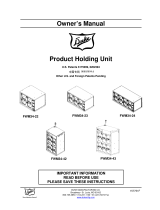 Duke Manufacturing FWM34-23 (ICC) Operating instructions
Duke Manufacturing FWM34-23 (ICC) Operating instructions
-
Duke Manufacturing FWM3-13 (Renau) Operating instructions
-
Duke Manufacturing FWM3-23-208 Operating instructions
-
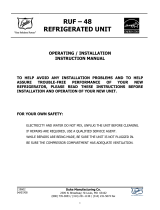 Duke Manufacturing SUB-RUF-48 Operating instructions
Duke Manufacturing SUB-RUF-48 Operating instructions
-
Duke FWM34-23 (ICC) Owner's manual
-
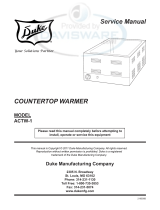 Duke Manufacturing ACTW-I User manual
Duke Manufacturing ACTW-I User manual
-
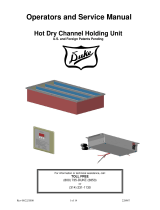 Duke Manufacturing HDC3-37.5, HDC4-44, HDC6-37.5 Operating instructions
Duke Manufacturing HDC3-37.5, HDC4-44, HDC6-37.5 Operating instructions
-
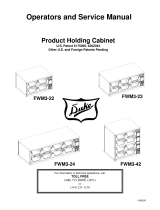 Duke Manufacturing FWM3-22 (ICC) Operating instructions
Duke Manufacturing FWM3-22 (ICC) Operating instructions
-
Duke Manufacturing FWM3-23-208 Operating instructions
-
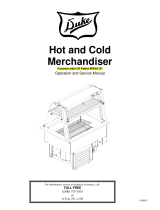 Duke Manufacturing CGHCM-36 Operating instructions
Duke Manufacturing CGHCM-36 Operating instructions
Other documents
-
4 Life Outdoor G40003 User manual
-
Duke MUHC 51 SERIES Operating instructions
-
Duke MUHC-52-120 Operating instructions
-
Duke HCSS-RH Operating instructions
-
Duke FWM3-23 Operator's And Service Manual
-
Omega CN9110A CN9120 CN9220A Owner's manual
-
Duke CSW-1 Operating instructions
-
Duke AHPO-6/18 GOLD Specification
-
Duke RCO User manual
-
Duke FLM200 Operating instructions




























